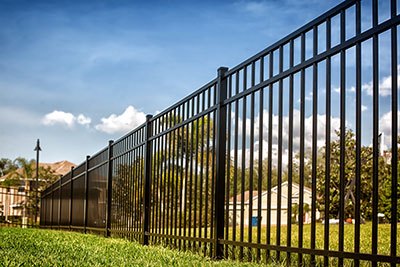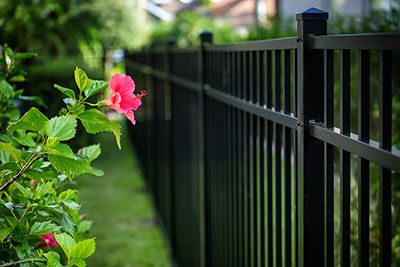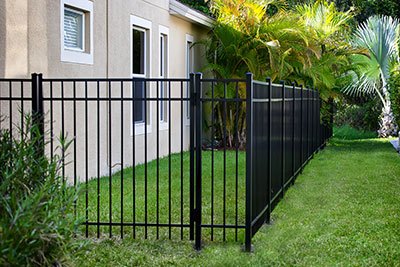Are you looking to upgrade your outdoor space in the most aesthetically pleasing and durable way possible? Installing an aluminum fence may be the perfect solution.
While they can require a hefty investment, with proper maintenance an aluminum fence will last for years and greatly elevate the look of your yard.
Whether you’re a beginner or know some basics already, this guide will provide you with all of the information necessary to make an informed decision as you choose and install your aluminum fence!
Take away key points:
- Aluminum fence pickets are ideal to prevent intruders from entering your house and will keep your pets inside the property
- They add a more beautiful look to your house and yard and also prevent pool accidents
- The fence is also ideal for gates, spacing, and other installation requirements and they are less expensive than other fence styles
Table of Contents
- Aluminum fencing as your best fencing option: Yay or nay?
- What is an aluminum fence?
- Types of aluminum fences
- Commercial and residential aluminum fences: The differences
- How to install aluminum fence panels?
- Benefits of fencing your property with an aluminum fence
- What are important accessories used in aluminum fencing?
- Aluminum fences vs. steel fences: Who’s the winner?
- Aluminum vs. Wrought iron fence: What’s a better solution?
- Aluminum vs chain link fences: Choose your fighter!
- Aluminum vs. Vinyl fences: What’s your choice?
- FAQs
- Final words
Aluminum fencing as your best fencing option: Yay or nay?
If you need to know more about aluminum fences, their benefits, and their main advantages, read the guide below. We have gathered all crucial information in one place.
What is an aluminum fence?

An aluminum fence is a type of fencing system that is made of durable and lightweight aluminum materials. Unlike other fencing materials like wrought iron or steel, aluminum fencing is cost-effective, with prices typically ranging from $25 to $40 per linear foot. This makes it the perfect solution for homeowners who want a sleek appearance for property boundaries.
Aluminum fencing panels are easy to install and require no additional maintenance once installed. The panels come in different sizes, designs, and colors to suit any property’s aesthetic requirements. With its weather-resistant nature, aluminum fencing can withstand harsh weather conditions and corrosion.
In addition to its aesthetic appeal, aluminum fencing also plays a crucial role in securing properties. Residential aluminum fences are commonly used to define property lines, provide privacy in high-traffic areas, and enhance the safety of your backyard by keeping pets and children inside the property’s boundaries.
Types of aluminum fences
Aluminum fences come in a variety of styles that cater to different needs and preferences. Here are some of the types of aluminum fence styles you can choose from:
– Traditional Aluminum Fence: The first style of aluminum fence ever developed, characterized by vertical pickets and horizontal rails.
– Ornamental Aluminum Fence: Features decorative pickets that can be customized to match different architectural styles and add aesthetic appeal to your property.
– Safety Aluminum Fence: Designed with taller pickets and closer spacing to provide maximum security for your property.
– Child Safety Aluminum Fencing: Similar to security fences but with a special focus on preventing children from accessing pools or high-risk areas.
– Swimming Pool Safety Aluminum Fence: Created specifically for pool enclosures to match building codes and protect kids.
No matter what your needs are, there is an aluminum fence example that can satisfy them.
Commercial and residential aluminum fences: The differences
When it comes to choosing an aluminum fence, it’s important to understand the differences between commercial and residential grades.
Commercial aluminum fences are typically sturdier and stronger than residential fencing, with larger pickets, rails, and a thicker gauge of aluminum. This provides enhanced durability, making them a great choice for commercial properties.
On the other hand, residential aluminum fences are typically more lightweight and decorative estate fencing protection, adding a touch of elegance to your backyard while increasing security.
It’s important to note that both commercial and residential aluminum fences may look similar to the eye, but the thickness of the posts and pickets differ. The commercial fence style is built to withstand greater wear and tear, while residential fencing is a more cost-effective style for homeowners.
Whether you install commercial or residential aluminum fencing, there are a variety of design finials to choose from. Residential fences increase the curb appeal, whereas commercial styles add more details to any establishment.
How to install aluminum fence panels?
With the right tools and materials, this task can be completed without professional help. Here are the simple steps to follow:
Step 1: Measure and plan
Using a tape measure, determine the perimeter of the area you wish to install the fence. Once you have your measurements, plan your fence layout and select the type and style of fence panels you want to install.
Step 2: Dig post holes
Using a post-hole digger or power auger, dig holes to the recommended depth into the ground, and diameter specified by the fence hardware manufacturer.
Step 3: Install posts
Mix concrete and pour it into each post hole into the ground. Place the post into the hole and make sure it is level. Allow the concrete to be set up according to the manufacturer’s instructions.
Step 4: Attach fence panels
Once the posts are secure, attach your aluminum fence panels to each post using the screws or brackets provided with your fence kit. Ensure the fence posts are straight and the panels are level as you work your way around your fenced area.
Benefits of fencing your property with an aluminum fence

These are the advantages of fencing your property with aluminum fence panels :
– Increased security: Aluminum fences can help keep your property safe and secure by providing a physical barrier between your property and the outside world.
– Low maintenance: Unlike many other fencing materials, aluminum fences require very little maintenance. They won’t corrode, or rot, and don’t need to be painted or stained for an optimal fence job.
– Increased curb appeal: Aluminum fences can be designed to look beautiful and complement the style of your home and landscaping, which can increase curb appeal.
– Increased resale value: Adding an aluminum fence to your property can increase its resale value by adding an extra layer of security and enhancing the overall aesthetic.
– Durability: Aluminum fences are strong, which means they can withstand harsh weather conditions, resist fading, and can last for many years to create better fence standards.
What are important accessories used in aluminum fencing?
Aluminum fence panels are ideal for increased aesthetic appeal around your property. However, to get the most out of your fence, you need to have the right accessories.
Here are some of the most important accessories used in aluminum fence panels:
– Finials and caps: These are decorative pieces that sit atop fence posts and add an elegant touch to fences.
– Mounts: Mounts are useful for attaching aluminum fence panels to walls, corners, and other surfaces.
– Latches and locks: These are essential for securing gate systems and ensuring that your property remains safe.
Aluminum fences vs. steel fences: Who’s the winner?
If you are looking for durable and secure fencing options, you might be considering aluminum or steel fences. To help you make an informed decision, let’s look at the pros and cons of each option.
1. Aluminum fencing
– Best installation for homes where the decorative look is the primary consideration.
– Inexpensive pricing compared to steel fencing.
– Tends to corrode over time.
– Not as strong as steel.
2. Steel fencing
– Stronger and sturdier than aluminum.
– More secure and damage-resistant.
– Resistant to rusting.
– Best suited for locations where strong barriers are required.
If you are looking for an inexpensive option with a decorative look, then aluminum fencing is a good choice. However, if you require a secure and damage-resistant fence for the long term, then steel fencing is the best option for you.
Keep in mind that while steel fencing has a higher price than aluminum, it is stronger, which means the installation would be worth it in the long run.
Aluminum vs. Wrought iron fence: What’s a better solution?
Are you torn between choosing an aluminum or a wrought iron fence? Let us help you make an informed decision!
While aluminum fences cost less per foot, wrought iron fences are stronger and more ornate than aluminum fences. However, aluminum fences are lighter in weight and easier to maintain. They are also rust-resistant, which can save you money in repair and replacement costs compared to metal units.
Aluminum fencing is more flexible than its metal counterparts, making it ideal for curved or steeply angled installation. It’s also sturdy enough for residential use, yard, or garden uses, although it can be dented or bent if enough force is applied.
On the other hand, wrought iron fences are stronger than aluminum fences, which reduces damage. However, scratches and dents can make the metal fences prone to rusting.
In addition, metal fence panels can withstand harsh weather and wind conditions, and potential intruders. But keep in mind that they can be expensive, require regular preservation, and is prone to corrosion or other types of damage if not treated correctly.
The choice between aluminum and wrought iron fence comes down to personal preference and budget. If you’re looking for a cost-effective and low-maintaining fencing solution, aluminum might be the way to go. If you would like a stronger and more ornate fence, consider the metal fences.
Aluminum vs chain link fences: Choose your fighter!
Here’s a breakdown of what we found in our search:
– Aluminum fences have many benefits: They won’t rust or corrode, they’re harder to climb, and they’re low-maintaining. Plus, they’re sleek and modern-looking, which can add to your home’s curb appeal.
– Chain link fences are generally cheaper: They’re also durable and strong, which makes them a good choice for some projects. However, they don’t offer much privacy and can look industrial.
Ultimately, the choice between aluminum and chain link fencing comes down to your priorities. If you want a fence that’s modern and low-maintaining, aluminum might be the way to go. But if budget is a bigger concern, chain link could be the better choice.
Aluminum vs. Vinyl fences: What’s your choice?

If you’re in the market for a new fence, you may be wondering whether to go for aluminum or vinyl. We’ve done the research for you and compiled the pros and cons of each.
1. Aluminum fence panels
Pros:
– Cheaper than iron and vinyl
– Stronger and more secure than vinyl
Cons:
– Higher initial costs than wood
– Less durable than vinyl
If you’re on a tight budget, an aluminum fence may be the way to go. They’re cheaper than vinyl and iron and still provide a strong, secure boundary for your property. However, they’re not as durable as vinyl and may require more maintaining tips.
2. Vinyl fence
Pros:
– Durable and long-lasting
– Resistant to weather and winds
– Low maintenance
Cons:
– Higher initial costs than aluminum styles
– Not as strong as aluminum styles
For those willing to invest in a long-lasting fence, vinyl is the way to go. They’re incredibly durable, resistant to weather and winds, and require little maintenance. However, they come with a higher price tag than aluminum and may not provide the same level of security.
FAQs
Is an aluminum fence cheaper than wood?
No, wood fence is cheaper than aluminum fence panels.
What are the disadvantages of aluminum fence?
Aluminum fences are not ideal for safety, as large or wild animals can easily break in.
Is an aluminum fence more expensive?
Aluminum fences’ longevity materials cost less than a vinyl fence or iron fence types.
Is aluminum good for fences?
Yes, they are ideal for aesthetic appearance and less maintenance.
Why aluminum fencing is better than iron fencing?
Aluminum fences are rust-resistant, and metal fences are not.
Final words
If you need more powder-coating and an aesthetic appearance, an aluminum line is the right fence for you! You don’t have to worry about posts, extra paint, spacing, and pickets, as they are all sturdy and keep your yard safe. Still, you can refer to other options if you think they will be better.
